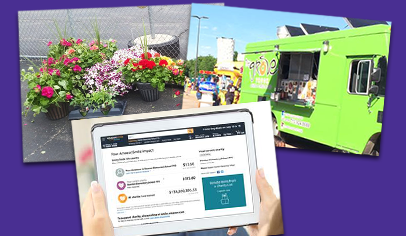Done right, choosing a fundraising company is more like Dancing With the Stars than American Idol.
Dancing With the Stars shows us a handful of people we (presumably) are interested in doing an activity we want to see. From among that handful of couples, viewers choose the winner.
American Idol starts with the premise “We’re looking for somebody who can sing.” Thousands of people who may or may not fit that description parade in front of the judges.
Sure, some of those early contestants are entertaining. Who can forget the man dressed only in pajamas, or the contestant who kissed grumpy judge Simon Cowell on the cheek? But it’s a long process for the judges, and certainly not the most productive way to reach a goal.
Choosing a fundraising company should start with knowing what your audience wants, knowing what you want, and finding the right company to match those two things. The producers of Dancing With the Stars started with the knowledge that there was an audience for competitive ballroom dancing if the show was done well. Likewise, you start by surveying or sounding out parents. You might learn, for example, that they would support a wrapping paper sale as long as the quality is decent and the price isn’t too high. The next step is to gather information on companies with products that match that description.
Following the American Idol method, on the other hand, starts with “We need a fundraiser.” Then you invite a dozen or more reps from fundraising companies to show you a wide variety of products, ranging from candles to frozen desserts to jewelry to stationery. If you go this route, you’re in for the long haul. By the time it comes down to making a final choice, you may very well be too worn down by the process to do it well. Plus, without any real information about what your customers want, you’re more likely to make the decision based on personal preference. The odds of your fundraiser being a dud increase.
Bring On the Contestants
The work of choosing the right fundraising company begins with your fundraising committee. Have them do most of the work. Don’t bog down the general meeting with detail work like choosing between brands of cookie dough. Leave those decisions to the people who have taken the time to learn the most about the process: the committee members.
There are several key steps to choosing the right company. Starting at the top will save time and energy.
Set your financial goal. Knowing how much you need to raise is important in selecting both the product you will sell and the company you will use. Begin with a budget, or at least a strong idea of what the money will be used for.
Choose what you’re going to sell. Get input from your customers, the parents, to find out what they will support. Is price an issue? Low-cost items that get used up, such as food, wrapping paper, and even candles, typically are the easiest products to sell. Also, consider past fundraisers and how they have fared, as well as what other organizations in the community are doing for fundraising.
Get product samples. It’s important to experience the products for yourself. Do they seem like a good value, or will parents be disappointed? It’s hard to tell from glossy photos. If you’re doing a catalog sale, ask to see samples of a few of the items to get an overall idea of quality.
Review the program. Even if the product is right for your group, the program the company offers might not be. Is the program flexible, and can it be adapted to fit your needs? Ask about turnaround time. Get specifics on how the products are delivered. Do they have materials that you will distribute to parents, and do those materials reflect well on your group? Ask how back orders are handled. Find out what happens if products are damaged when they are delivered. Pin down costs for shipping, prizes, and other miscellaneous items. You don’t want any surprises.
Consider the sales rep. In most cases, the person who you work with before you sign the contract will be the same person who helps organize and execute your fundraiser. His level of professionalism during this part of the process tells you something about what it will be like working with him later on. Is he knowledgeable? Responsive? If he’ll be interacting with parents and students, essentially he’ll be representing your group. Do you feel comfortable with that?
Check references. Don’t skip this step. Preferably, you want references from schools similar to yours in terms of size, demographics, and fundraising goals. You also want to hear from schools that worked with the same sales representative. Find out whether he delivered on his promises. Ask about turnaround time, hidden costs, and the salesman’s responsiveness and professionalism. Would the group run this sale again, or do they plan to switch to something else?
Negotiate the contract. Use the information you’ve gathered so far to make sure the sale will be run in a way that best meets your group’s needs. Don’t be shy about stating what you want; you have more leverage at this point in the process than you will have later on. Keep in mind, though, that there is always a trade-off. Negotiating a higher profit margin means there will be cuts elsewhere, such as in service.
A True Partner
There’s one more way that choosing a fundraising company is like Dancing With the Stars. It may seem like the salesmen are performing for you when they come to talk about what they have to offer. But if you choose the right company, the work will be a partnership. You’re both working toward the same goal—you want to make the fundraiser as successful as possible, and they have a vested interest in doing so, as well.
Taking the time to choose the right fundraiser and fundraising company now can set you up for years to come. When the same sale is repeated year after year with sustained success, that usually means your PTO has a satisfied customer base. You have established a fundraising tradition anchored by this particular company and its products and parents are telling you, by their support, not to change a thing. That’s a great place to be, but you’ll only get there if you’re dancing with the right partner.
What To Expect From a Fundraising Company
There are clear advantages to using a fundraising company for your product fundraiser. For starters, you’ll be dealing with a company whose purpose is to help other organizations raise funds while being profitable in its own right. The company is motivated the same way you are: Sell more products to make more money. It is in the company’s best interest to have a successful relationship with your parent group so you’ll renew your contract the following year.
In addition, good fundraising companies have sales expertise. They know what sells and how to market their products in the most appealing way. They’ll provide high-quality brochures, desirable items, professional packaging, secure handling, and efficient shipping to ensure their customers’ satisfaction. You should also expect strong customer service.
The company, through your professional sales representative, will typically handle back orders, item returns, and breakage during shipping. Your rep will often take on some of the hands-on work herself, like conducting the program kick-off assembly.
Several other things you might expect:
- Online access—Many professional fundraising companies now offer online order entry with direct shipping. This allows relatives and friends from all over the country to support your parent group.
- PTO coordinator training—The company may provide a guidebook to help the volunteer who is coordinating your fundraiser learn the secrets to a successful sale. The sales representative, too, can provide on-the-job training, drawing on his experience in the industry and with other parent groups in your area.
- Prize program—Professional fundraising companies know what sorts of prizes can entice students and families to participate. Increased participation means increased profits for your group.
- Contract-signing bonuses—Sometimes your group can earn special bonuses or incentives just for signing on with a professional fundraising company.
- Sales analysis information—Your sales representative, using information provided by the company after the fundraiser is over, can help your committee identify ways to improve profits next year.















